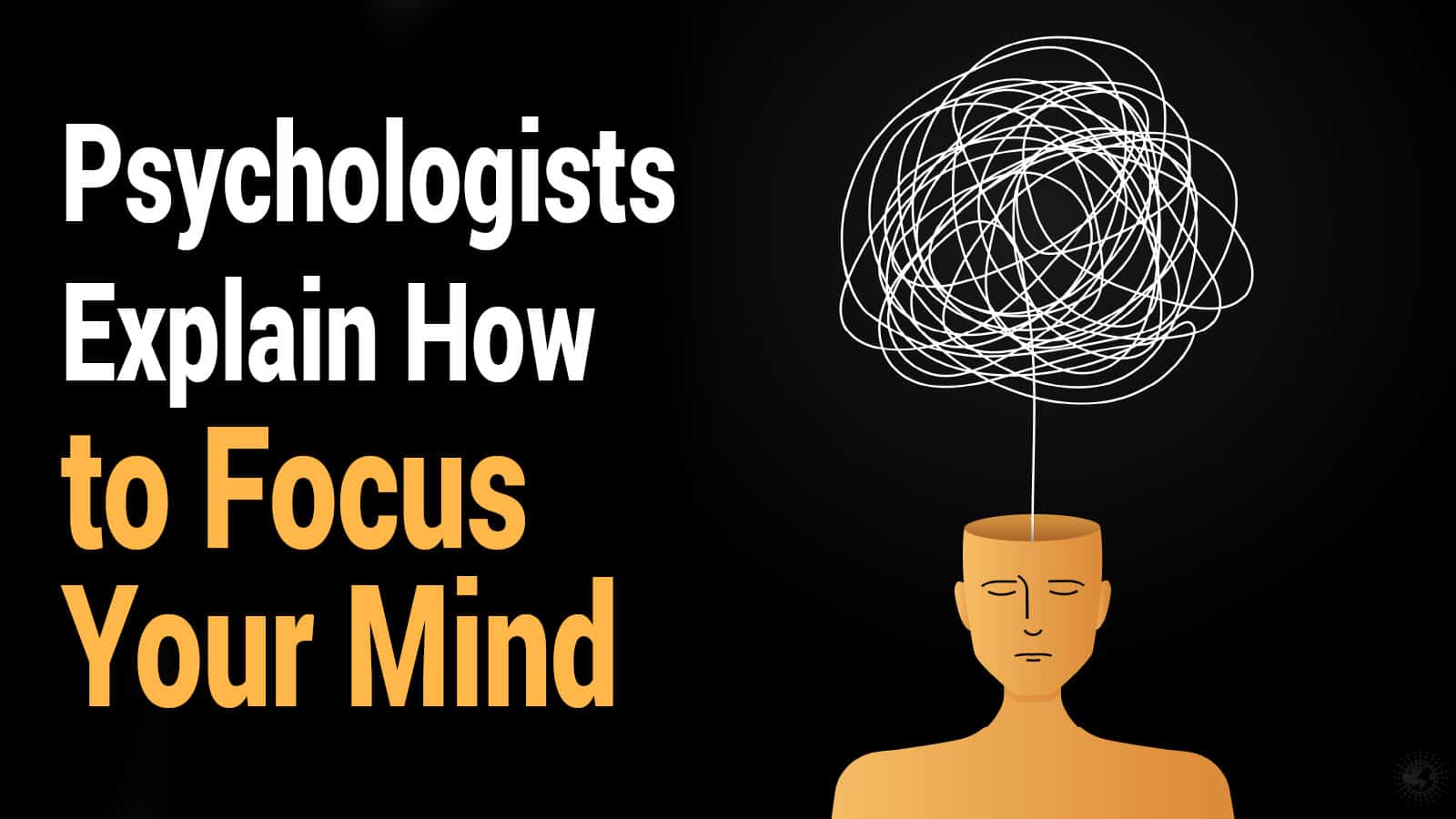The human brain is both exceptionally adaptable and resilient. Scientists have coined a term for these innate qualities of the brain: neuroplasticity.
Neuroplasticity can be defined as: “The brain’s ability to reorganize itself by forming new neural connections throughout life.” There’s an emphasis on the words ‘throughout life’ here. The reason is that most people think that brain development is stagnant after a certain age.
We now know this to be untrue.
Indeed, it is this neuroplasticity with which we are going to hone our focus abilities to their peak – regardless of age.
But we must first acknowledge that neuroplasticity is a double-edged sword. Our brains will absorb the bad just as much as the good. As such, we must do our best to eliminate the former to maximize such outstanding benefits like enhanced focus.
We’re going to define focus as ‘the ability to direct and hold our mental resources onto a task.’ That is, we direct our attention to what requires it – and hold it there until the task is complete.
This focusing ability may be the biggest differentiator between individuals who achieve what they set out to do – and those that don’t. In other words, a strong focus will almost assuredly lead to goal achievement.
Before getting into the ten scientifically-backed ways of achieving laser-like focus, let’s discuss what must first be overcome: distraction.
Understanding Distraction
“By prevailing over all obstacles and distractions, one may unfailingly arrive at his chosen goal or destination.” ~ Christopher Columbus
When it comes to focusing, we must all deal with multiple distractions, all of which fall into one of two categories – internal distractions or external distractions. To truly focus requires that these disturbances be overcome or, at the very least, minimized.
Internal distractions are those that cloud the mind and stir the emotions. This inner frenzy is perhaps the biggest obstacle to doing what needs to be done. For referential purposes, here are just a few of the myriad internal distractions that we must overcome:
- Lethargy
- Laziness
- Anxiety
- Procrastination
- Fear
- Doubt
- Hesitation
- Boredom
- Impulsiveness
- Insecurity
- Low self-worth
An internal distraction is one that originates from the mind or body that has nothing to do with the task at hand.
An external distraction is one that originates in your environment, and may include:
- Chatty coworkers
- Loud noises
- IM notifications
- Cell phone notifications
- Chit-chat
- Clutter (especially around your desk)
- Kids playing
- Pets
- Poor lighting
- Music
An external distraction is one that originates from an outside stimulus that has nothing to do with the task at hand. Without recognizing and eliminating (or minimizing) these distractions, any attempts to become more focused will prove fruitless.
Now’s a good time to bring in the neuroplasticity effect.
If you remember, neuroplasticity can be thought of as a double-edged sword. In this case, distractions are one side of the sword – and focus is the other. What side of the blade are we going to choose? Also, keep in mind that once we want, it’s challenging to stop the brain’s powerful momentum!
Now, let’s get to the juicy part. Here are ten scientifically verified ways to achieve laser focus:
 10 Approaches to getting Laser-Sharp Focus
10 Approaches to getting Laser-Sharp Focus
“Concentrate all your thoughts upon the work at hand. The sun’s rays do not burn until brought to a focus.” ~ Alexander Graham Bell
-
Eliminate distractions
This can not be repeated enough, which is why it’s again repeated here. We simply cannot focus optimally amidst a din of distraction.
Please make sure that you understand (really understand) this point before moving on.
In case you wanted to know the scientific ramifications of continuous distraction, consider the following findings by the London Institute of Psychiatry:
- Emails produce an “addictive, drug-like grip” on our attention.
- The average IQ loss caused by distractions is about 10 points.
- Compulsive activity tires and slows down the brain
- A study revealed an “almost complete lack of discipline” in how we handle emails and virtual communications.
Move away from that chatty coworker. Deal with any internal conflict. Put on some headphones. Pop in some earplugs. Show some restraint in how you handle emails and text messages.
Get rid of or minimize distractions, and your focus will automatically be enhanced.
-
Monotask
Almost (but not quite!) as important as eliminating distractions is doing one thing at a time.
The simple fact, which is uncomfortable to some, is that multitasking is mostly a myth. For emphasis: multitasking doesn’t exist.
Task-switching, on the other hand, does exist, and it couldn’t be any different from “multitasking.” Task-switching is precisely that: we engage and disengage our attention with multiple tasks – sometimes very quickly. We’re not handling two tasks simultaneously, ever.
If it sounds like task-switching is inefficient, that’s because it is. First, there’s a sort of attention residue that remains as we move on from a task. Per Science Direct, attention residue “refers to cognitions about a [task] that persist even though one has stopped working on [the task]… and is now working on Task B.”
The result is that we drain our cognitive resources while getting less done.
-
Say ‘No’
Look, nobody likes to say ‘no.’ But here’s the thing: every time we say ‘yes’ to something, we’re saying ‘no’ to something else.
What are we saying ‘no’ to? Possibly those things that can improve our lives. So, in a way, we’re always saying no to something. It’s our job to make sure we’re saying no to things that bring little value.
What are those things?
They usually come in the form of ‘favors.’ To make things harder, people are pretty good at making you feel bad if you turn down their pleadings of “Pretty please…”
Ask yourself what you can afford in terms of time, then give in.
-
Manage your energy, not your time
It’s so much easier to remain focused on something if we have adequate energy levels. Moreover, we perform at our best when our energy levels are high.
It only makes sense then to schedule the necessary things for when your energy peaks.
Unfortunately, we’re often in the habit of planning things using time as a barometer. The problem with traditional scheduling is that it doesn’t consider your energy capacity. This isn’t a big deal if the task is dull and monotonous. It is a big deal if the job requires some real brainpower.
-
Get proper sleep
This one needs to introduction. For proper focus, it is essential to get adequate sleep. Per the National Sleep Foundation (NSF), seven to nine eyes of shuteye not only enhances focus, but also aids in decision making, productivity, reaction time, and memory.
-
Practice meditation
Talk about something that should need no introduction. Meditation, done correctly, may just be the most useful mind and brain training there is. Quite simply, no activity hones attentional skills quite like a regular meditation practice.
In a study published in the journal Psychiatry Research, participants of two types of meditation – focused-attention (FA) and open monitoring (OM) realized improved executive attention (or ‘attentional control.’) Scientists witnessed no improvement in concentration in the relaxation-only group.
-
Drink some java
Here’s some good news for all of the coffee lovers! Meta-analysis research shows that drinking up to four cups of brewed coffee per day improves cognitive function, “particularly alertness and vigilance [and] … perception of fatigue.”
The research also found that up to 400 mg of tea per day (around 8 cups) produces similar cognitive benefits.
-
Listen to Mozart
Researchers from Stanford University found that listening to classical music enhances the attentional capacity. If this sounds familiar, you’re probably thinking of the so-called ‘Mozart Effect,’ which purports that listening to Mozart increases general intelligence.
Why classical music and not another genre? Because classical music is entirely instrumental. There are no words or lyrics to cause distraction. Moreover, since much classical music features periods of silence – known as “transition points” – it helps to keep hearers alert and attention.
-
Get some cardio
We most commonly associate exercise with physical improvements, but the effect can be mental as well. Plenty of research suggests that cardiovascular exercise (‘cardio’) increases the size of the brain’s hippocampus, the brain area involved in learning and verbal memory.
Per an article published by Harvard Medical School, exercise improves the brain both directly and indirectly. It lowers inflammation, reduces insulin resistance, and stimulates the release of growth factors known as ‘BDNF.’ It can be deduced that physical activity improves focus as well, as exercise is known to improve mood and sleep and reduce anxiety and stress indirectly.
-
Practice relaxed concentration
To reap the full benefits of focus, you must remain relaxed and at ease. Too much tension caused by over-striving isn’t conducive to concentration and will only hinder your efforts.
Allow the mind’s focus to emerge naturally from a mind and body that’s at ease, rather than constricted or tight.






















